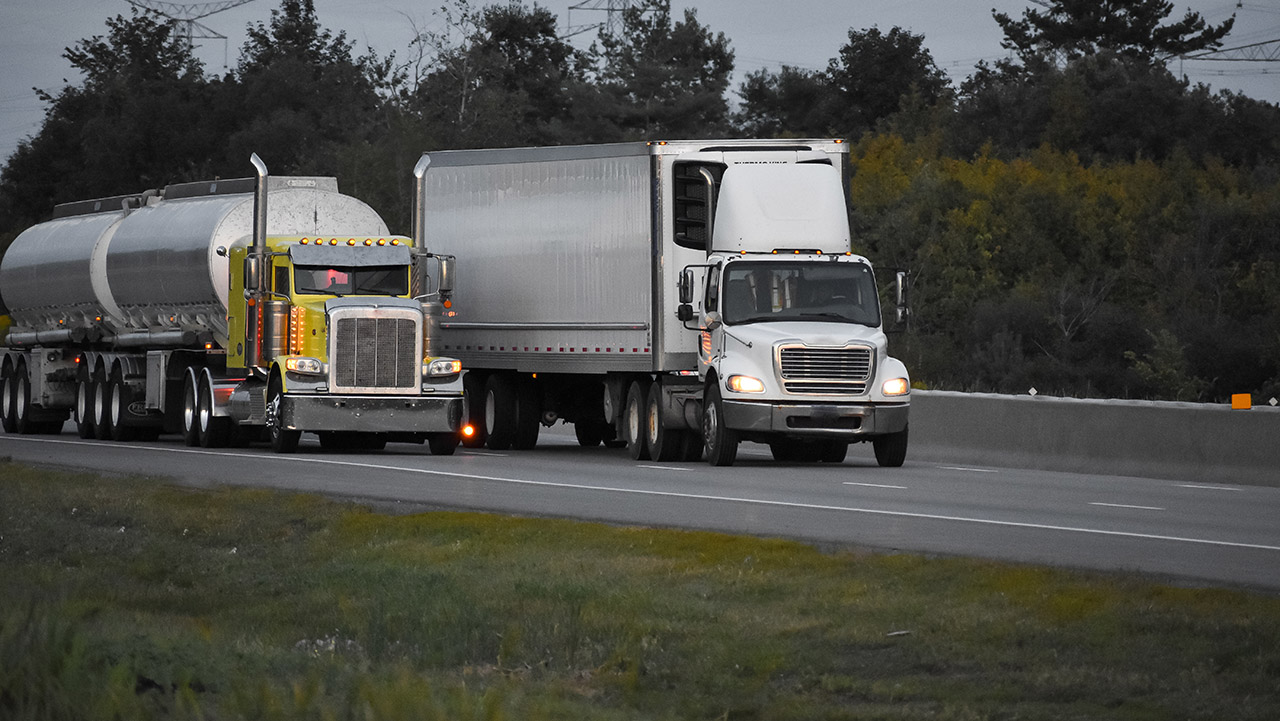New medium- and heavy-duty vehicle electrification report outlines benefits for all Minnesotans.

Electrifying medium- and heavy-duty vehicles is good for climate, public health, and long-term costs savings. That’s the clear takeaway from a new report from Fresh Energy on behalf of the Coalition for Clean Transportation released today forecasts the benefits of adopting policies that support the rapid electrification of medium- and heavy-duty vehicles in Minnesota. By doing so, Minnesota could reap cumulative societal benefits of at least $9.9 billion and up to $18.5 billion between 2022 and 2050, while also better staying on track to meeting its climate goals and boosting community health, particularly for communities living near high-traffic roadways, a large portion of whom are Black, Indigenous, and People of Color (BIPOC) and/or under-resourced.

The report found that reductions in fuel use—particularly of diesel fuel used by medium- and heavy-duty vehicles—will reduce cumulative net greenhouse gas (GHG) emissions by at least 35 million metric tons and up to 88 million metric tons through 2050. This is the equivalent of removing more than seven million passenger vehicles from the road for one year. Reductions in fuel use will also reduce cumulative nitrogen oxide (NOx) and particulate matter (PM) emissions in Minnesota by over 85,000 tons and 750 tons, respectively, by 2050. The reduction in NOx alone is equivalent to Minnesotans driving nearly 58 billion miles less per year!
Breathing elevated levels of these emissions over long periods of time causes significant negative health impacts like asthma, heart disease, cancer, and premature death. Estimated public health benefits of increasing Minnesota’s share of medium-/heavy-duty electric vehicles include reductions in premature deaths and fewer hospital admissions and emergency room visits for asthma, avoiding more than 100 premature deaths and nearly 100 hospital visits and saving Minnesota more than $1.3 million in health-related costs.
Economy-wide, the report found annual financial benefits to Minnesotan electric vehicle drivers and electric vehicle fleets, with the average medium-/heavy-duty electric vehicle owner saving more than $16,000 over the life of the vehicle by 2030—and a reduction in total state annual fossil fuel use of at least 380 million and up to 8.2 billion gallons by 2050. These projected fuel savings will help promote energy security and independence, protect Minnesotans’ pocketbooks, and keep more money in the local economy as these new electric vehicles shift to Minnesota-made clean electricity, generating an even greater economic benefit for communities across the state.
“These numbers back up what Fresh Energy and partners have been advocating for years: that electrifying our delivery vans, buses, and trucks make absolute sense from a climate, health, and economic perspective,” said Anjali Bains, lead director of Energy Access and Equity at Fresh Energy. “It is critical that Minnesota lays the groundwork to support medium-/heavy-duty electric vehicles, given their key role in addressing climate change, transportation pollution, and racial inequity. We look forward to working with decision-makers and advocates to translate this report’s forecasts into reality.”
“Communities of color in Minnesota live in high traffic areas with more air pollution, which contributes to higher rates of chronic illness, including asthma. Policymakers at all levels of power in Minnesota need to set goals and standards for phasing out toxin-emitting vehicles, including diesel, in a way that uplifts equitable and healthy communities, invests in green jobs, and stops climate change,” said Madi Johnson, a clean transportation organizer with MN350. “Right now, cities and schools are leading on large vehicle electrification. We need to see statewide goals and policies in place.”
“The transition to zero emission trucks and buses is urgently needed to reduce the worst impacts of climate change and air pollution,” said Joshua Houdek, senior program manager with the Sierra Club North Star Chapter. “Minnesota’s leadership in reducing emissions will improve the lives of people across the state.”
Policy action at the state and local level in Minnesota will set our state up to reap the benefits of zero-emission, carbon-free vehicles across the transportation sector, resulting in annual net benefits of at least $1.1 billion and up to $2.1 billion by 2050 from GHG reductions, air quality improvement, and fuel savings. This report comes at a crucial juncture in the shift to an electric transportation future and at a time when Minnesotans, along with the rest of the U.S., are experiencing the instability and volatility of the fossil fuel market. This report also comes on the heels of Vice President Kamala Harris’s announcement of major federal investment to expand clean public transit and school buses, reduce emissions from dirty diesel trucks, and create good-paying jobs in the process.
After a successful campaign to adopt clean car standards in Minnesota for passenger vehicles concluded last summer, the Coalition for Clean Transportation has shifted toward electrifying the biggest source of health-harming diesel emissions in Minnesota: medium- and heavy-duty vehicles. For more information on how all Minnesotans can be involved in jump-starting the electrification of Minnesota’s transportation sector, please join experts and advocates from the Coalition, including Fresh Energy, MN350, and Sierra Club North Star Chapter for a webinar on March 17 to get the inside scoop into how the electrification of Minnesota’s medium- and heavy-duty vehicles can amp up our state’s transition to a zero-emission future.
